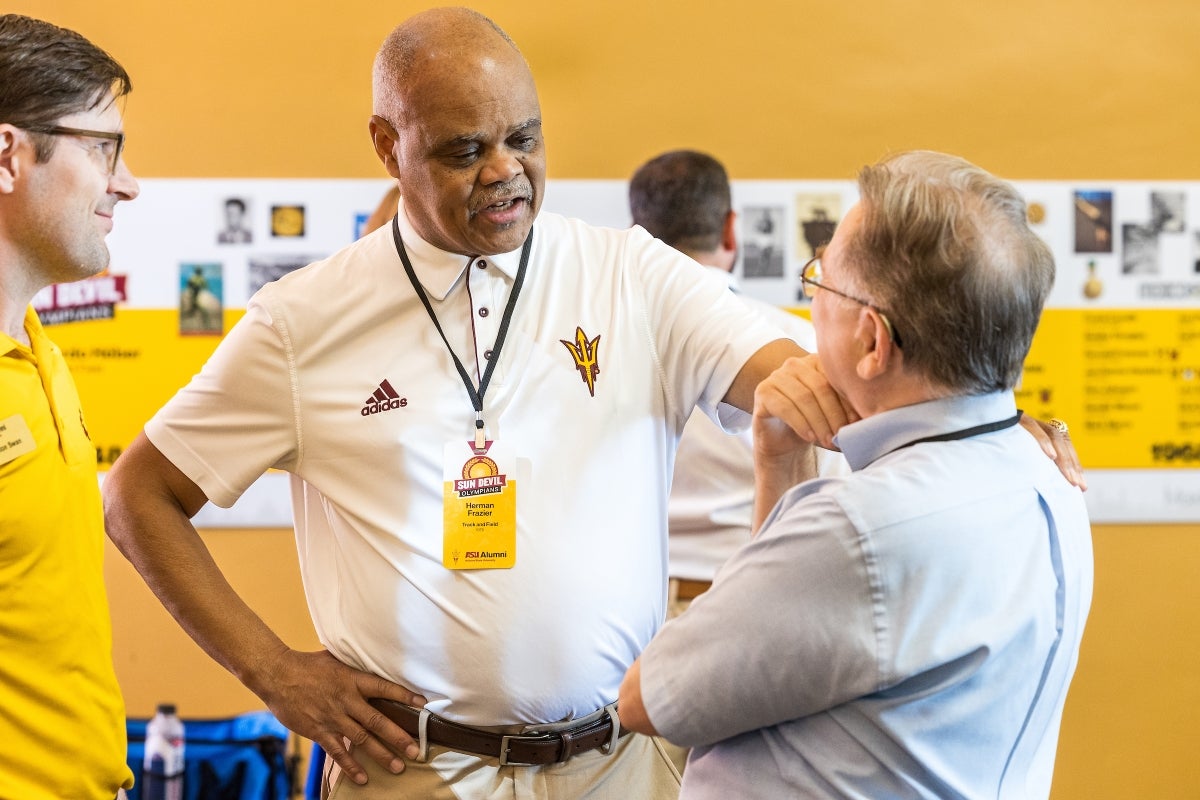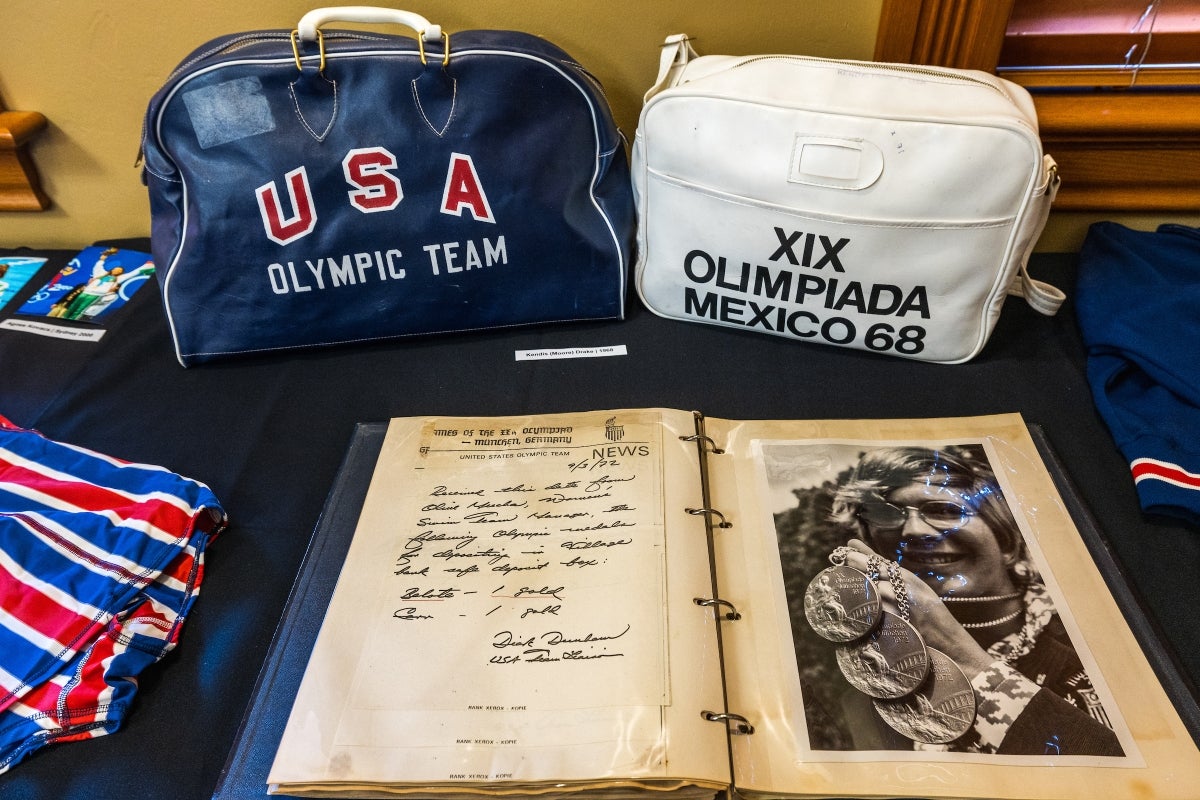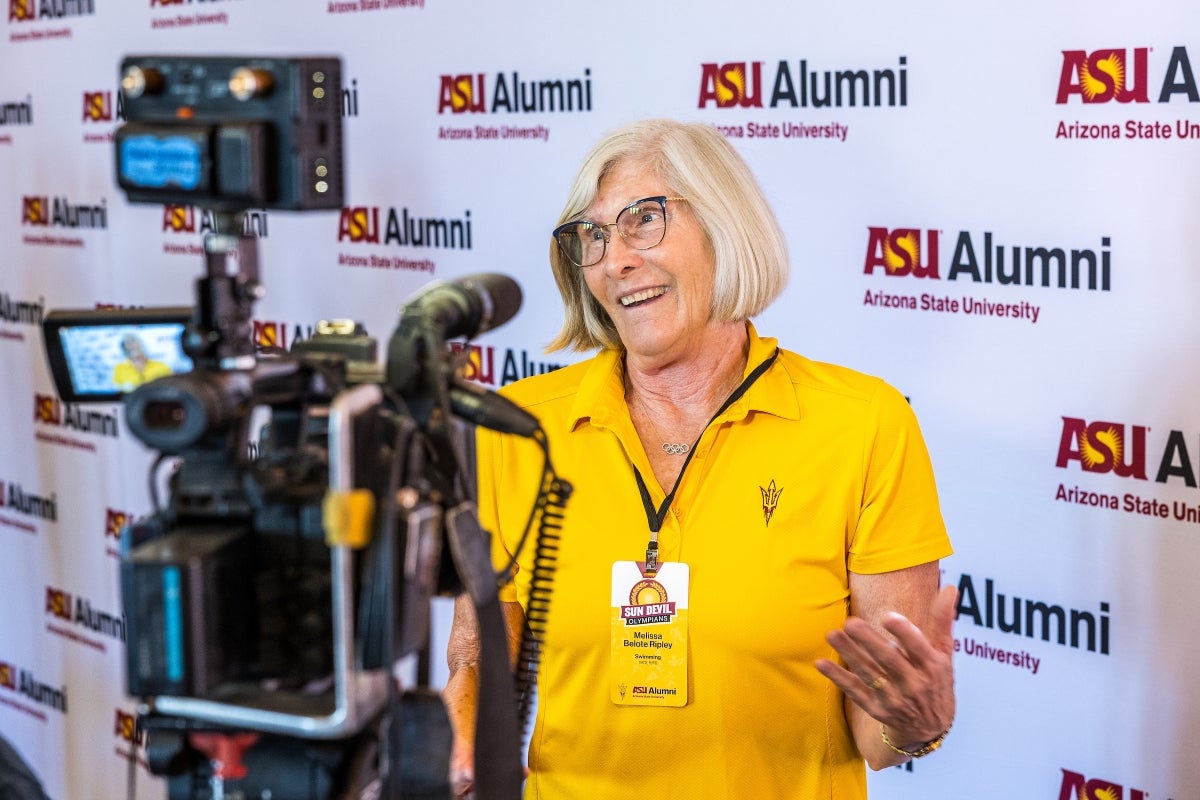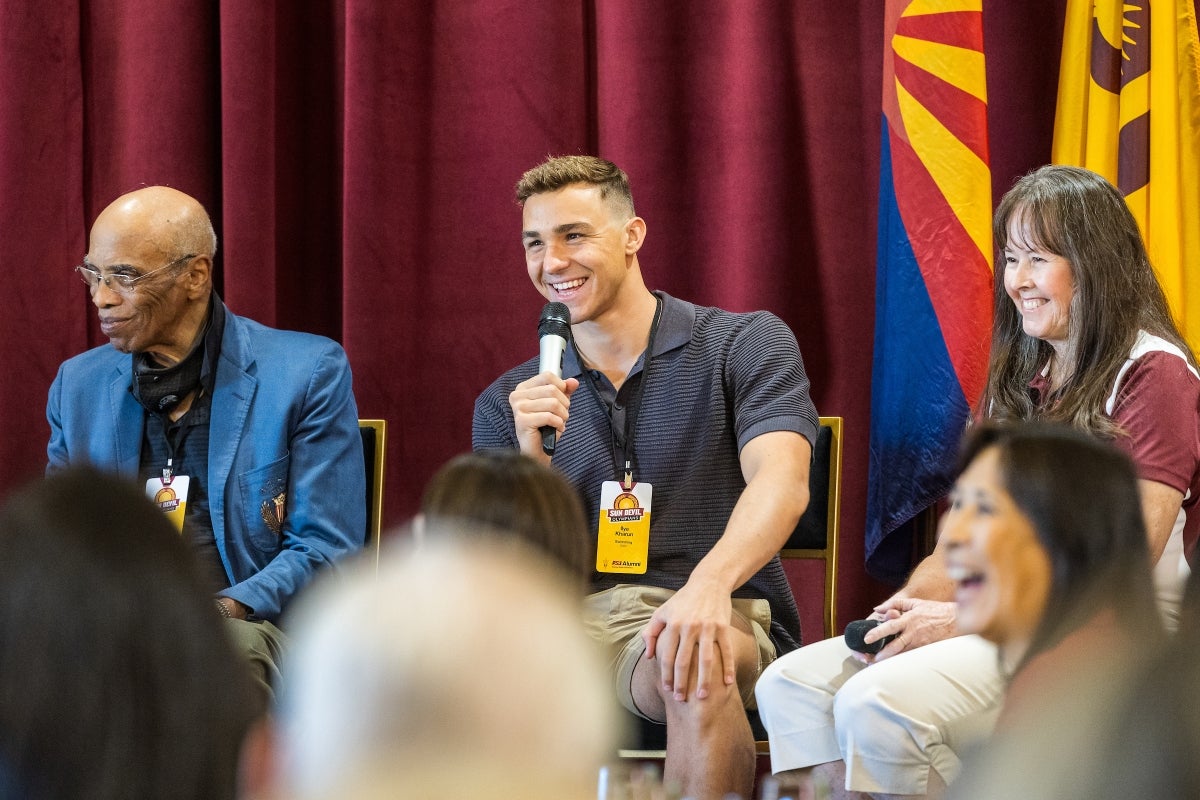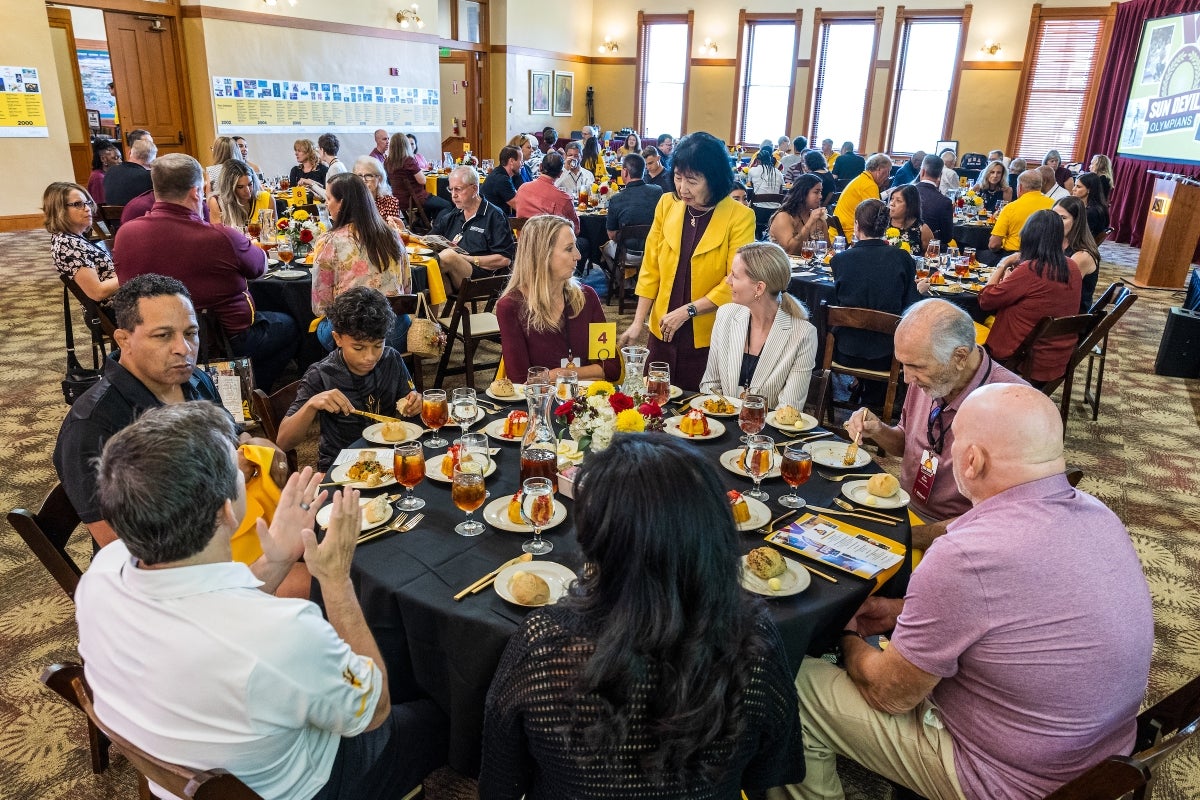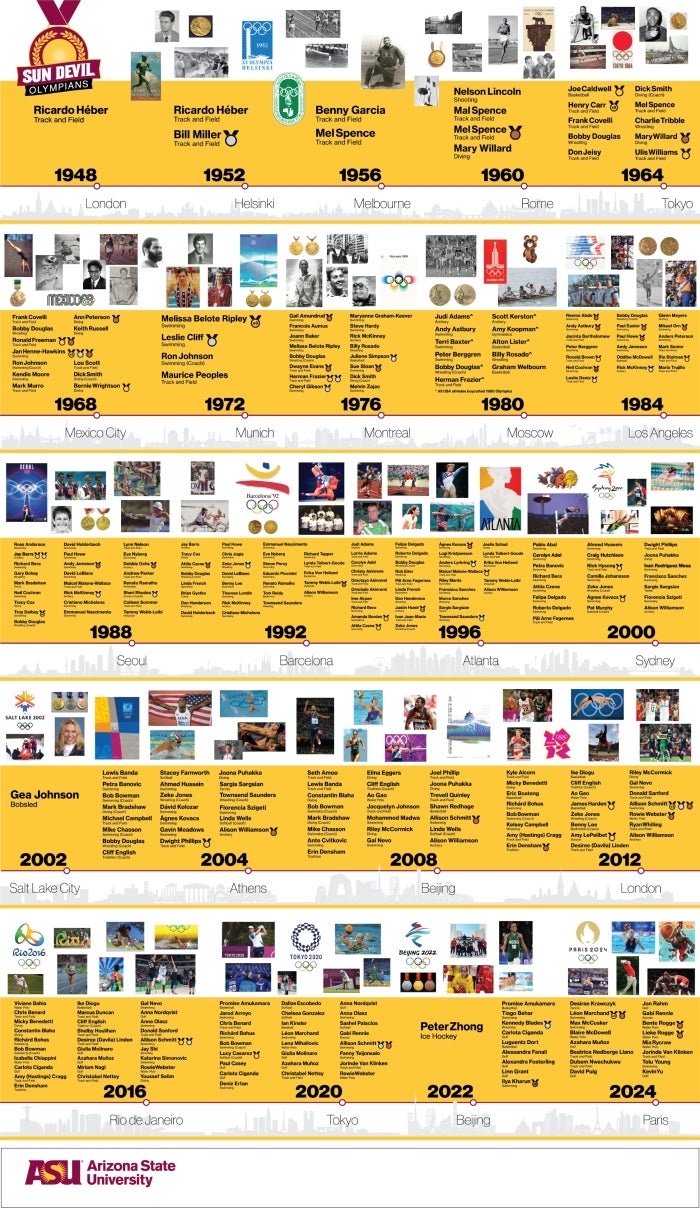'You get that flutter in your heart again': ASU Olympians honored at luncheon

Sun Devil Olympians gather on the steps of Old Main on Oct. 11 for a photo during a luncheon honoring them for their athletic achievement and ASU legacy. Photo by Tim Trumble
They gathered on the steps of Old Main for a picture, young and old, representing different sports and countries, their commonality measured by three words: Sun Devil Olympians.
There was Joe Caldwell, a member of the 1964 U.S. men’s gold medal basketball team.
And Melissa Belote Ripley, winner of three gold medals in swimming.
Herman Frazier, the leadoff runner for the 1976 Olympic gold medal-winning 4x400 relay team and a 23-year ASU athletics administrator.
And Ilya Kharun, who won two bronze medals in swimming in the recent 2024 games in Paris.
They laughed, shared stories and talked about joints that don’t work quite the way they used to.
(Well, the last part doesn’t yet apply to Kharun. He’s 19 years old.)
The 34 men and women who gathered at the Sun Devil Olympian Luncheon in the Carson Ballroom also proudly talked about their days at Arizona State University and, to this day, their deep affection for the university.
“I lived and breathed maroon and gold, and I always will,” Frazier said. “This is a special place for me, and having the opportunity to come back and share some glorified moments with so many other people I respect means a lot.”
The Oct. 11 event, hosted by the ASU Alumni Association, showed off the breadth and depth of ASU’s Olympic participation. Since Ricardo Heber competed in javelin in the 1948 Summer Games, ASU has produced 217 Olympians from 48 countries and in 19 different sports.
“We’re in the top 20 of all the universities in Olympic medals, and we’re in the top 15 of all universities in national championships and national champions,” ASU President Michael Crow said. “So this is, athletically, a highly, highly competitive institution and has been for a long time.”
Crow told the Olympians that he could appreciate their talent and discipline because he threw the javelin at Iowa State University. His best throw, he said, was about 227 feet, about 60 feet less than the top javelin throwers.
“There was literally no conceivable way that I could get from 220 to 290,” Crow said. “It wouldn’t make any difference if I spent 1,000 hours day on it. It wasn’t going to happen. All of you Olympians, you know you have achieved at the highest level of human performance while also being students.
“So this notion of mind, body, spirit, those three things advancing together and showing all of the rest of us what it takes to be a champion on a global scale against other young world-class athletes from countries all over the planet is unbelievable.”
Athletics Director Graham Rossini said the event reflected his desire that ASU athletes will be Sun Devils for life.
“It has to manifest into us creating reasons for all generations of Sun Devils to be back on campus and to relive some great memories and rekindle great relationships,” he said, “but, more importantly, share their knowledge with the current group of athletes.
“I think what’s really special about these kinds of reunions is the alumni come back and, whether they’ve been tied together or whether they’ve been away for a while, you kind of get that flutter in your heart again.”
Rossini called the luncheon “awe-inspiring” and thanked the athletes for representing ASU as “a student and an athlete at the highest level of sport.”
“It’s something that will inspire many, many generations for years to come,” he said.
Former ASU and Olympic archery coach Sheri Rhodes took note of the 48 flags that were flying outside the ballroom.
“ASU is hiring coaches that attract people from all over the world,” she said. “Athletes are saying, ‘I want to work with that person.’ It says a lot about our hiring practices.”
“We’re a world community here at ASU,” added Belote Ripley, who competed in the 1972 and 1976 Summer Games.
During a panel discussion moderated by Mike Wong, associate director in the Office of University Events and Protocol, Frazier, Caldwell, Kharun, Rhodes and Agnes Kovacs (swimmer in 1996, 2000 and 2004 Olympics) were asked about lessons they learned at ASU that helped them succeed.
Kovacs said the support and encouragement she received from her teammates and coaches before the 2004 Games — she had been sick for months before the Olympic trials — convinced her she could do what she thought impossible.
"I got the courage I needed," she said.
Frazier credited the discipline he learned under legendary and longtime track coach Baldy Castillo.
“I was prepared,” Frazier said. “I was prepared not only to compete, but I was also prepared to win. And the training that I received here, the education I received here are all the things that enabled me to be able to do that.
“I always say that I've never had the opportunity to serve our country as someone in the military, but to represent our country and win a gold medal is something I will never ever forget.”
A timeline of ASU Olympians
More Sun Devil community

Student-led business organization celebrates community, Indigenous heritage
ASU has seen significant growth in Native American student enrollment in recent years. And yet, Native American students make up less than 2% of the student population.A member of the Navajo Nation,…

Remembering ASU physical chemist Andrew Chizmeshya
Andrew Chizmeshya, a computational chemist and materials scientist whose work spanned over three decades at Arizona State University, died on March 7 at the age of 63.A dedicated mentor and cherished…

Supporters show their generosity during Sun Devil Giving Day 2025
Thousands of Arizona State University supporters from across the globe came together on Sun Devil Giving Day on March 20 to give to scholarships, research, student programs and university initiatives…


